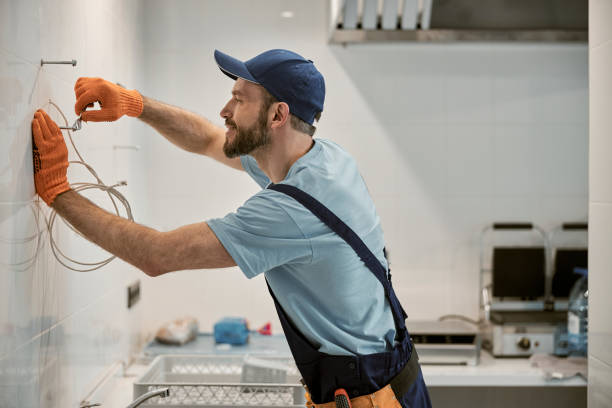How Ignoring Emergency Plumbing Problems Could Ruin Your Insurance Claims

When a plumbing emergency strikes, it’s natural to feel overwhelmed. Many homeowners believe that delaying the call to an emergency plumber or trying a quick DIY fix will help save money. However, ignoring plumbing issues can lead to more serious consequences, including extensive property damage. One of the most overlooked risks? It could jeopardise your ability to successfully claim insurance compensation. In this blog, we’ll explore the impact of ignoring plumbing problems and how doing so can affect your insurance claims, leaving you out of pocket.
1. Why Plumbing Emergencies Should Never Be Ignored
It’s tempting to put off fixing what may seem like a minor leak or clogged drain, especially if it happens at an inconvenient time. But small plumbing issues can quickly escalate into full-blown emergencies, such as burst pipes or flooding. These problems are not only costly to repair but can also damage your property’s structure and belongings.
Most insurance providers expect homeowners to act promptly to prevent further damage. If you delay calling an emergency plumber and the problem worsens, insurers may argue that your negligence voids the policy coverage. The fine print in many home insurance policies states that policyholders are responsible for taking reasonable steps to minimise damage.
2. Common Plumbing Issues That Require Immediate Attention
Plumbing emergencies can occur unexpectedly, and certain situations demand immediate action. Below are some common issues that need to be addressed by an emergency plumber without delay:
- Burst pipes: A burst pipe can flood your home in minutes, damaging floors, walls, and furniture.
- Blocked drains: Ignored blockages can cause sewage backups, creating unsanitary conditions.
- Boiler leaks: Leaks around your boiler system can not only damage walls but also disrupt heating.
- Water heater failure: When your water heater stops working or leaks, it can result in water damage and loss of hot water supply.
- Frozen pipes: If not thawed promptly, frozen pipes may burst and lead to flooding.
Each of these emergencies has the potential to cause significant damage to your property. Insurance providers expect homeowners to take swift action when faced with these situations to mitigate the impact.
3. The Role of Insurance in Plumbing Emergencies
In the UK, home insurance policies often cover sudden and accidental water damage resulting from plumbing issues, such as burst pipes. However, insurers generally exclude damage that results from neglect or lack of maintenance. If your insurer believes you could have taken action earlier but failed to do so, your claim may be denied.
Additionally, policies often come with stipulations about immediate notification. If you experience a plumbing emergency, you must inform your insurer within a specific timeframe. Failure to follow these rules could result in your claim being rejected, even if the damage itself was covered.
4. How Delays Impact Insurance Claims
When plumbing issues are ignored, the extent of the damage can increase significantly. Insurers assess the damage not only based on the initial incident but also on whether the policyholder acted promptly to limit further harm. For example:
- A slow leak: If a slow pipe leak goes unaddressed for weeks, the resulting water damage could spread to walls, floors, or ceilings. An insurer might classify this as a maintenance issue, which is typically not covered.
- Clogged drains: Ignoring blocked drains can lead to sewage backups, which may result in health hazards. If insurers believe that a timely response could have prevented it, they might deny the claim.
- Boiler leaks: Letting a small leak from the boiler continue without repair could cause mould or structural issues. Insurers expect homeowners to address such issues immediately.
If it becomes clear that your actions—or lack thereof—worsened the damage, insurers are likely to reject the claim entirely or offer reduced compensation.
5. Documentation Matters: The Importance of Emergency Plumber Receipts
When it comes to insurance claims, documentation is crucial. Hiring a qualified emergency plumber not only fixes the problem but also provides you with proof that you took swift and appropriate action. Keep all receipts and reports from the plumber, as these documents can serve as evidence that you tried to minimise the damage.
Many insurance providers require homeowners to provide proof of repairs to process claims successfully. A professional plumber’s report will also detail the cause of the issue, which can support your case that the damage was sudden and not the result of neglect.
6. The Role of Preventive Maintenance in Protecting Your Insurance Coverage
While emergencies are unpredictable, regular maintenance can help prevent many plumbing disasters. Insurers may look more favourably upon claims when homeowners demonstrate they have invested in preventive measures. Regular plumbing inspections can identify potential risks, such as worn-out pipes or faulty fixtures, before they become emergencies.
Additionally, some policies may offer lower premiums or added benefits if you can show that you maintain your plumbing system. Ensuring your plumbing is in good working condition reduces the risk of emergencies, which benefits both you and your insurer.
7. Don’t Forget the Heating System: Involve a Heating Engineer When Needed
Some plumbing emergencies, such as boiler leaks or water heater failures, overlap with issues related to your home’s heating system. In these cases, calling a heating engineer along with an emergency plumber may be necessary to address the problem thoroughly. A heating engineer is trained to handle complex heating systems and ensure everything is in safe working order.
Insurers may require you to involve the appropriate specialist if the emergency involves heating equipment. Failing to do so could result in incomplete repairs, which might invalidate your claim if the problem recurs.
8. What to Do When a Plumbing Emergency Occurs
When faced with a plumbing emergency, acting quickly and following the right steps can make all the difference in your insurance claim. Here’s what you should do:
- Turn off the water supply: Locate the main water shut-off valve and turn it off to prevent further flooding.
- Call an emergency plumber: Contact a certified professional immediately to assess and fix the issue.
- Document the damage: Take photos or videos of the affected areas before any repairs begin.
- Notify your insurer: Inform your insurance provider as soon as possible, following their guidelines for reporting emergencies.
- Keep receipts and reports: Retain all paperwork related to the repairs and submit them with your claim.
By taking these steps, you increase the likelihood of a smooth claims process and prevent further damage to your property.
9. Conclusion: Don’t Risk Your Insurance Claim
Ignoring plumbing emergencies may seem like a way to save time or money, but the consequences can be severe. Delayed action often results in greater damage, higher repair costs, and the potential rejection of insurance claims. Insurers expect homeowners to act responsibly and take immediate steps to mitigate damage.
Calling an emergency plumber at the first sign of trouble can save you from costly repairs and ensure your insurance claim is processed smoothly. It’s also important to engage a heating engineer when heating systems are involved to guarantee complete and effective repairs. In the end, taking swift action is the best way to protect both your property and your financial interests.

